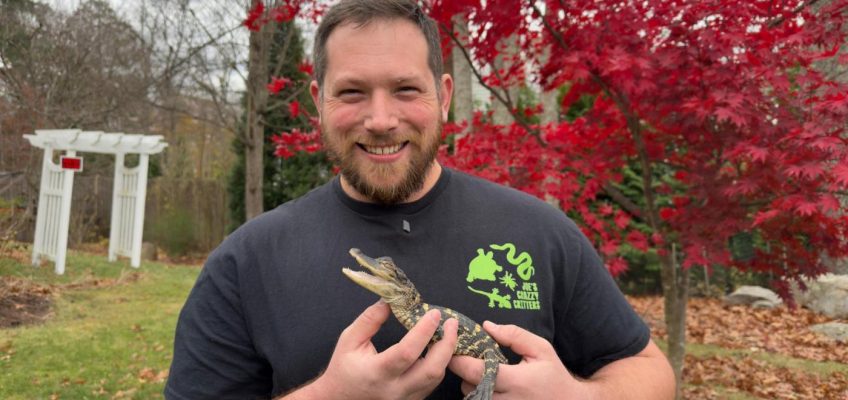By RODRIQUE NGOWI and PATRICK WHITTLE
BOSTON (AP) — It wasn’t a croc — there really was an alligator on the loose in Boston.
Related Articles
Some Korean workers detained in Georgia immigration raid have returned to their jobs at Hyundai site
Blue Origin launches huge rocket carrying twin NASA spacecraft to Mars
BBC apologizes to Trump over its misleading edit, but says there’s no basis for a defamation claim
Trump’s next immigration crackdown will target Charlotte, North Carolina, a sheriff says
ACLU lawsuit alleges appalling conditions at California’s largest immigration detention facility
And the story of the city’s slithering saurian appears to have a happy ending. The small alligator, spotted along the Charles River in Boston multiple times this week, has been rescued and delivered to safety, wildlife officials in Massachusetts said Thursday.
The roughly foot-long crocodilian startled a few people and became an instant social media star after confused onlookers took videos of it slipping out of sight. But the animal is not native to Massachusetts, and couldn’t possibly survive the harsh New England winter, so the search for the wayward gator was on.
A local wildlife educator captured the critter on Wednesday night, and it’s now awaiting a permanent home, officials said.
Harvard University graduate student Whitney Lieberman was among the residents who caught a glimpse of the exotic visitor. She notified wildlife authorities when she saw the creature while she was jogging to work.
“Yeah, I did a double-take. For a second, I had to check myself — alligators are not native to Boston waterways, right?” Lieberman said. “I texted my coworkers because I had a morning meeting: ‘Hey guys, this is a good excuse to be late for work. There is an alligator right in front of me and I don’t know what to do.’”
This image provided by Whitney Lieberman shows a small alligator sighted on the Charles River Esplanade, Tuesday, Nov. 11, 2025 in Boston. (Whitney Lieberman via AP)
The animal was in jeopardy due to the chilly temperatures. It was 51 degrees Fahrenheit along the Charles on Thursday. Alligators prefer temperatures above 80 degrees. They are cold-blooded and can’t regulate their own temperature, so they enter a dormant, energy-saving state called brumation to survive colder temperatures.
Joe Kenney, who runs a wildlife education business called Joe’s Craz-zy Critters, captured the alligator, the Massachusetts Division of Fisheries and Wildlife said in a statement. It said the state has temporarily authorized Kenney to keep it for now while it evaluates where to find a long-term place for it.
Kenney, of Abington, Massachusetts, said the alligator, being young and just a foot long, is basically harmless to humans. He said he located it by walking in the area where it was last reported and was “a little shocked” when he found it.
Joe Kenney holds an alligator he rescued after it was discovered in Boston’s Charles River, Thursday, Nov. 13, 2025 in Abington, Mass. (AP Photo/Rodrique Ngowi)
He said fans of the reptile have reached out to him and some asked to name it “Charles.” Kenney said the animal was probably someone’s impulse purchase, but not a good idea for a pet.
“An alligator isn’t designed to live in a fish tank. Really, ideally, it should be living out in the swamp in the southern United States,” Kenney said. “And they can get pretty big. So even though this guy is still little, by the time he’s somewhere around 10, 15 years old, he’ll be an adult alligator.”
Adult alligators can grow to more than 11 feet long and weigh more than 500 pounds.
The wildlife department said the alligator’s appearance is still under investigation, but added it was most likely a pet that escaped or was intentionally released.
Joe Kenney holds an alligator he rescued after it was discovered in Boston’s Charles River, Thursday, Nov. 13, 2025 in Abington, Mass. (AP Photo/Rodrique Ngowi)
“MassWildlife is working in close collaboration with the Environmental Police to find a safe home for this alligator as an educational animal with a permitted facility. This incident serves as an important reminder that it is not legal to keep alligators or any crocodilian species as pets in Massachusetts,” state herpetologist Mike Jones said in a statement.
Alligators have a history of occasionally showing up in urban areas far from their native ranges. One, dubbed Chance the Snapper, turned up in Chicago in summer 2019 and was eventually trapped. Another one showed up on the Charles River in the Boston area in 2010.
Whittle reported from Scarborough, Maine.


Leave a Reply